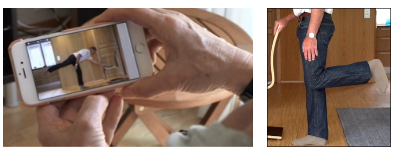Balance, strength and physical activity are important factors for healthy ageing and preventing age-related functional decline. In order to be effective, preventive interventions must target risk factors for functional decline, be tailored to the needs and preferences of the individual, and be designed to change behaviour to a sustained healthier lifestyle. Smartphones and smartwatches are used by an increasing number of people, with thousands of smartphone applications available to promote healthy lifestyles. However, few of these applications are evidence based, meaning that their contribution to overcoming the challenges presented by an ageing population is limited.
The European Project ‘PreventIT’ (EU Horizon 2020 Grant Agreement No. 689238) aims to address this issue, by developing an evidence-based mHealth behaviour change intervention. PreventIT has adapted the Lifestyle-integrated Functional Exercise (LiFE) programme, which reduced falls in people 75 years and over (BMJ 2012; 345:e4547), for a younger cohort (aLiFE). The aLiFE programme incorporates challenging strength and balance/agility tasks, as well as specific recommendations for increasing physical activity in young-older adults, aged 60-70 years. Personalised advice is given on how to integrate strength, balance and physical activities into existing daily routines. aLiFE was then operationalised to be delivered using smartphones and smartwatches (eLiFE), providing the opportunity to send timely motivational messages and real-time feedback to the user. Both aLiFE and eLiFE are behaviour change interventions, supporting older adults to form long term physical activity habits. PreventIT has taken the original LiFE concept and further developed the behaviour change elements, explicitly relating and mapping them to Social Cognitive Theory and behaviour change techniques. Goal setting, planning, prompts and real-time feedback are used to deliver a person-centred experience for participants in the intervention. Findings from the aLiFE and eLiFE pilot studies highlighted the feasibility and acceptability of the PreventIT motivational strategy, with the vast majority of the participants rating the programmes positively (satisfaction score median: 6 points, out of maximum 7).
Mobile technology such as smartphones and smartwatches can be used effectively to monitor behaviour and to deliver a personalised intervention. The PreventIT mHealth intervention focusses on behaviour change from initiation to long-term maintenance, addressing the different phases of adopting a healthier lifestyle. As such, it makes a strong contribution to the developing field of evidence-based mHealth. The interventions (aLiFE and eLiFE) are currently being trialled in a three-site, three-arm feasibility randomised controlled trial in Norway, the Netherlands and Germany. An overview of the project can been viewed on YouTube: https://www.youtube.com/watch?v=upAfGHbNvdU

Publication:
Helbostad JL, Vereijken B, Becker C, Todd C, Taraldsen K, Pijnappels M, Aminian K, Mellone S. Mobile Health Applications to Promote Active and Healthy Ageing. Sensors. 2017; 17(3):622. http://www.mdpi.com/1424-8220/17/3/622
About the Author

Dr Lis Boulton
Research Associate in the School of Health Sciences at the University of Manchester
Dr Lis Boulton is a Research Associate in the School of Health Sciences at the University of Manchester, UK, and is a member of the EU-PreventIT consortium. Her research focusses on the use of technologies to facilitate behavioural change, to encourage older adults to be more physically active. Lis works with Professor Chris Todd in developing and operationalising the motivational strategy for PreventIT. ()
Copyright
© 2018 by the author. Except as otherwise noted, the ISPGR blog, including its text and figures, is licensed under a Creative Commons Attribution-ShareAlike 4.0 International License. To view a copy of this license, visit https://creativecommons.org/licenses/by-sa/4.0/legalcode.
ISPGR blog (ISSN 2561-4703)
Are you interested in writing a blog post for the ISPGR website? If so, please email the ISGPR Secretariat with the following information:
- First and Last Name
- Institution/Affiliation
- Paper you will be referencing
